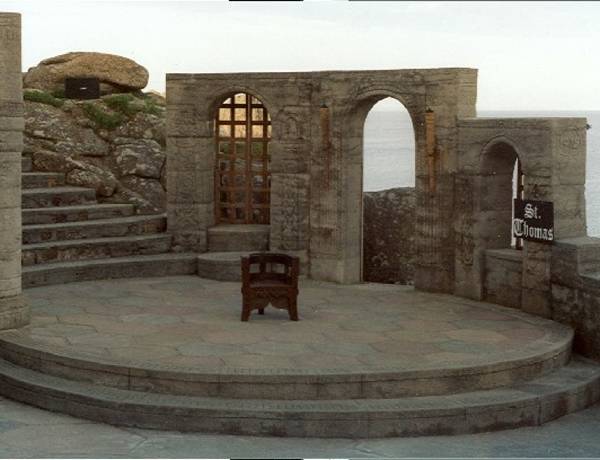ExperiDance – Folk Dance Reinterpreted
by

Veronika Morvai (photo: Árpád Pintér)
Dynamic movement, exciting stories… all of this in a world that is unique and inspiring, and simply grabs the audience. The ExperiDance musical theatre group opened its gates to me: granting me access to their labyrinthine art form, on the short and winding corridors before success, and right up to the threshold of international fame. During this amazing voyage I became privy to information that only very few ever get to know.
Folk dance, despite the appearances
István Györffy, the famous anthropologist once said that folk dance is standing on its very last legs. The youth of today have been “infected” with international dance, and thus they no longer find traditional folk dance to be inspiring or even interesting: they do not want to be traditional folk dancers.
But ExperiDance seems to have proven him wrong, and has elevated folk dance to new, international levels.
“We really showed a completely different side of folk dance. I think that we have proved that this is not an antiquated genre, and that it can revitalise itself” – explains János Boda dancer, who is the director at ExperiDance. “We wanted to bring something to the stage that could captivate many people, especially those who do not necessarily care about this genre.”
“This form of dance can speak to anyone, and can make folk traditions and culture palatable to laypeople” – says Veronika Morvai, who also dances with the troupe. – “We represent a popular approach to dance. We seek to infuse modern dance steps with folk dance. We use modern dance, but we express it using folk dance. Everything has an emotional basis.”
“What can better express a story told through dance on stage?”– asks Veronika and Judit Bistei, who is one of the founding members of ExperiDance.
Folk dance is an interesting form of dance not just from a cultural standpoint, but from a technical one as well. If you lose your culture, you lose everything, so the saying goes, and it should be no surprise that this is also true in the world of dance. Folk dance adds a certain plus not only to the personality and knowledge of the dancer, but to the actual repertoire of steps as well. This is why it is so indispensable in the world of dance, even if it is definitely hard to make it as a traditional folk dancer.

Róbert Péli (photo: Márton Nagy)
Conquer the world with Hungarian dance steps?
Many people have wondered if this concept isn’t doomed to failure from the start. But the dance troupe believed in itself and in the possibilities that folk dance holds.
“I have seen many kinds of folk dance, and I think Hungarian folk dance is a really unique one, and it tends to captivate audiences. When I visited Japan, I experienced first-hand how much couples dancing and dance that involves objects really appeals to people, and these are elements that can be found in our dance culture. It is so diverse and can be sued to express so much…” – says the director.
But Veronika sees the success and uniqueness of ExperiDance in a slightly different light:
“We put folk dance in a completely new environment, we use it differently. We try and tell stories in a given piece. The music is also not traditional, but a more modern rethinking of the old classics.”
This is all due to the very diverse array of knowledge that the troupe has, and to the choreography of Sándor Román, who – to the greatest delight of his dancers – has his mind set on world class performances, both in terms of stage tech, set design and storytelling.
“He doesn’t want to just tell a story, but is constantly wondering what kind of extras, unique aspects, hitherto unused elements could be used in his choreography. He is well ahead of his time, and uses visual and musical elements that others wouldn’t touch” – adds Norbert Patonai, who is also one of the founders of this dance group.
“We are making folk dance trendy, by interweaving it into trendier mediums. It is well known that whatever is trending tends to attract more people, and this in turn can be a big help for us in popularising our genre” says Veronika and Róbert Péli dancer who was also among the first people to join the illustrious dance troupe.

János Boda (photo: Árpád Pintér)
The Price Of Success
Luckily live theatre seems to never go out of fashion completely, and there is demand for quality performances, but with so many dance troupes dong so many different kinds of interpretive dance, it is hard to stick out of the crowd. And to keep your excitement and passion burning without it burning you out is perhaps even harder. And then there is the question of continuity, of training young talent….
Although there is no set recipe for achieving harmony, the members of ExperiDance seem to talk about dance and their group with honest passion.
“As with everyone, we also experience ups and downs. There are always difficulties, but we try and rise above these challenges together. It is important that these problems remain invisible on stage”– says Veronika. “It is the love of the audience and their constant support and feedback (which we have had the privilege of enjoying for many years) that keeps us going.”
“It feels extremely good, as a dancer, to get up on that stage and be greeted with a standing ovation or with the stomping of a packed crowd”– continues Róbert, smiling.
Judit also joins in on the nostalgia train. She tells us that many times she can see the faces of the people in the first row, and that she often sees deep gratitude and love in the audience. This is the best “congratulations” and feels wonderful.
The troupe’s favourite memory is in Berlin however, where they received a very long standing ovation from the German crowd. This is quite a feat, as it is not uncommon for Berliners to walk out of a performance right in the middle of it if they do not like it. So a standing ovation is a rare show of appreciation.
Judit Bistei (photo: László Szalai)
But success always comes with a price, and they have worked hard for it. The dancers rehearse for 5-6 days a week, from early morning until the afternoon. Aside from very serious physical demands, these dance moves require a lot of concentration as well, and to reach the precision needed, sometimes even more needs to be given.
“You need total devotion and discipline to not ruin yourself in this. In order to rehearse a move perfectly, it is not uncommon to sacrifice your free time. Luckily, our job is our passion. And we always find time to relax a little…” says Norbert.
But total devotion requires a totally devoted dancer. Only few dancers have what it takes to live up to ExperiDance’s super high standards.
“You wouldn’t believe how hard ti is to find dancers who can utilise the ExperiDance style properly! Newbies usually take around 2 years to train until their body can properly accept the new and unique dance moves” reveals Veronika.
This is the reason why ExperiDance has started a dance school where they can hone new talent, and where fledgling dancers can familiarise themselves with this unique style.
All of the members of this group want to continue dancing in the future. Some want to teach at the dance school, while others would accept an honorary title as well.

Norbert Patonai (photo: Árpád Pintér)
The Ballade of the Pearl Haired GirlYou should quit while still on top, or so the saying goes. But luckily, the dancers of ExperiDance are not anywhere near done yet. The troupe is currently working on a ground breaking new performance, which, according to choreographer Sándor Román, will create a new genre of musical theatre. The production will be a unique synthesis of vocal music, instrumentals, dance and prose. |
written by: Franciska Kiss
translated by: Márk Mizsei














